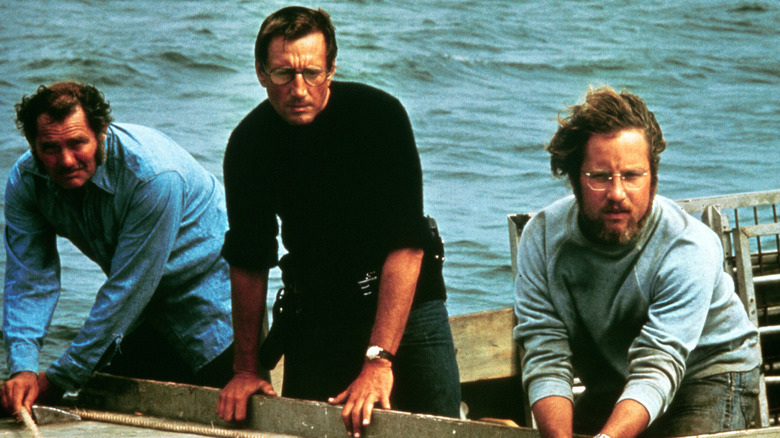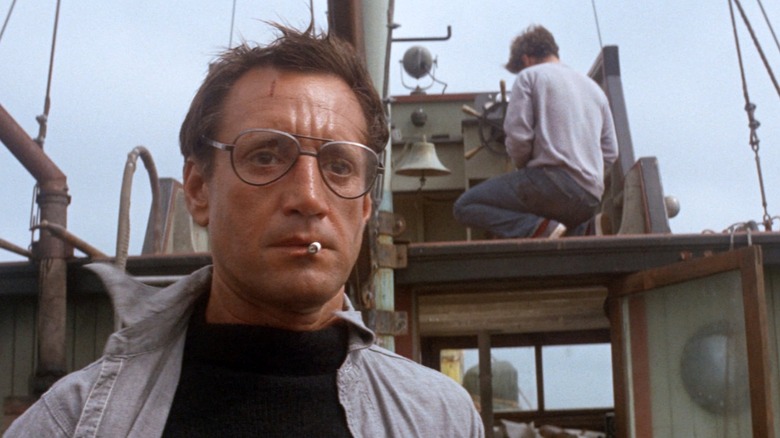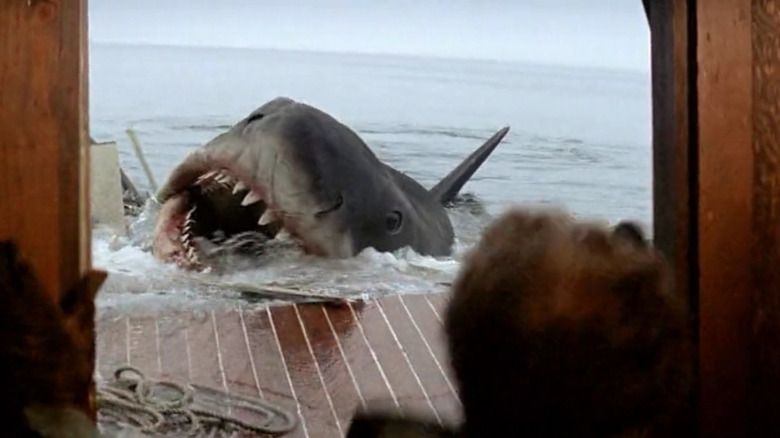Jaws Forever Changed The Way Movies Were Released, And We're Still Feeling That Impact
Take a moment and think about going to the movies, specifically what that actual process entails, and what information you need to know in order to start the process. The awareness that a film you might be interested in is playing in theaters is the most important step. You reading this website likely already know that, say, "28 Years Later" is opening this weekend, but for a more casual filmgoer, seeing a trailer in the movie theaters, online, or on television is key. Most chain movie theaters have an advance ticketing system where you can buy and reserve seats online, but even this system is still first-come, first-served (have you got your tickets for "Superman" yet?). And some local theaters may still require you to arrive before showtime to ensure that you won't get sold out. After all, this is summertime, which is the season of big blockbuster movies, as everyone knows.
Would you believe that all of the aspects of moviegoing mentioned in the above paragraph are a direct result of the success of "Jaws?" Strange but true. The Steven Spielberg film, which is celebrating its 50th anniversary this week, unwittingly became a watershed movie for the entire film industry upon its release in June of 1975. As with most important moments in history, the moviegoing revolution that "Jaws" ushered in exists on a spectrum, and isn't solely attributable to "Jaws" by itself. Prior successful releases like 1972's "The Godfather" and 1973's "The Exorcist" helped prime the pump for the blockbuster craze that soon swept the world, and Hollywood studios had been exploring alternative methods of marketing and advertising for quite a while before the "Jaws" TV spots became ubiquitous.
Yet there's no question that the way movies were released before "Jaws" and after it are two different things, and the movie is the clear transfer point between the approaches. Although we're used to things moving pretty fast in the 21st century — especially concerning trends in cinema and entertainment — it's wild to look back 50 years and realize that one film is responsible for a change that, thanks to its success and lasting legacy, allows us to still feel its impact.
'Jaws' ensured that heavy marketing would become a staple of every release
It's erroneous to say that films weren't advertised before "Jaws." After all, the concept of the movie trailer is almost as old as cinema itself. Still, there is a marked difference between the way films were announced before "Jaws" and after. According to Robert Levin, who has worked in movie marketing at various major studios throughout his career, this difference lies in the distinction between publicity and marketing. As Levin said during an interview for Frontline in 2001, the decision Universal made to lean on TV advertising for "Jaws" helped bring about this change in approach:
"...studios got more and more enamored with the power of television to open more screens, more theaters. [...] They found television to be this powerhouse. Before that, what we now call marketing departments were called publicity departments, because it was a publicity-driven business. You can't go back and find in the early days in the movie business vast amounts spent in advertising. [...] There was a movie preview, or we call it a trailer, but not a lot of advertising."
Universal's strategy for advertising "Jaws" on TV wasn't nearly as extensive as the average media buy for a movie is these days. The studio flooded the networks with spots just a few nights during primetime before the film's June 20th opening, and the consensus seems to have been that this campaign directly contributed to the movie's massive box office take. Of course, other factors have to be included in that — the popularity of Peter Benchley's source novel and the word-of-mouth hype surrounding the movie are significant contributors, too. But executives took particular note of how the awareness of "Jaws" was helped enormously by the marketing campaign, and soon enough, it wasn't just the big tentpole movies that were being advertised on primetime television, but just about every release from a major studio. It's an approach that only grew as television itself expanded into the cable era, providing more opportunities for ads across a large number of channels.
When Peter Guber, a producer of "The Color Purple," "Batman," "Air," and many other films, spoke to Frontline about the impact of "Jaws," he mentioned the importance of the marketing in conjunction with the film's wide release strategy:
"These wide releases, these enormous expenditures of prints and advertising in publicity and marketing costs and expenditures. They would create this enormous swell of momentum that would create gargantuan box office from the beginning."
How 'Jaws' made wide releases and the summer movie season the new standard
Guber's point about the relationship between advertising and the release itself is well taken, for all the marketing in the world won't pay off if a psyched-up audience can't find a way to see the movie. That's why the even bigger change that the release of "Jaws" brought to the way films are released is Universal's decision to open the film as wide as possible on the same date. That sounds standard to anyone born after 1975, but believe it or not, most movies were released more akin to today's "limited release" schedule, where a film would play for a couple months in just one place (typically a large city) before moving to other locations, and then eventually end up in second and third run theaters in more rural areas.
Following the success of the release of "The Godfather," which broke this mold, Universal decided to open "Jaws" on some 400-odd screens, and in just 78 days, the film surpassed Francis Ford Coppola's mafia movie in box office receipts. Levin, echoing Guber's statement, explained how this dual strategy of marketing and a wide release all but ensured a victory:
"The concept was that instead of going out in a few number of theaters in a city and then expanding more and more and more, if you went and advertised a movie on network television and successfully interested an audience in that movie, you could open everywhere at the same time."
The other most impactful aspect of the release of "Jaws" is its timing. Before "Jaws," the summer season was considered a dead zone for the cinema due to one simple problem: a lack of air conditioning in the theaters. When that issue began to be addressed during the late '60s and '70s, audiences began seeing movie theaters not as a place to escape from, but to escape to. As such, it proved that there was potential for theaters to become a draw during the hottest months of the year, and "Jaws" and its beachy summer setting were like catnip. Thus, other studios and other major releases followed suit, and both the blockbuster movie and summer movie season were born.
In addition to all of this, "Jaws" did one more thing to impact how films are released today, and that's to demonstrate how much more a film can be appreciated when seen with a packed audience. We may have more options for watching films today than we ever have before, but there's still nothing that can beat the experience of a communal watch of a great movie, just like there aren't many films that can beat "Jaws."


